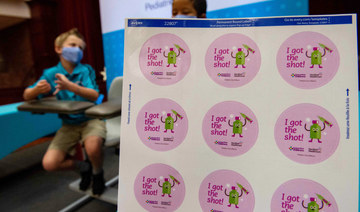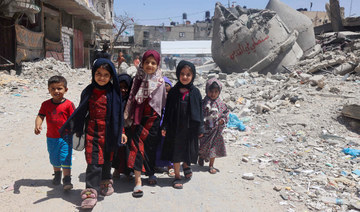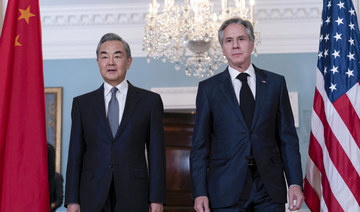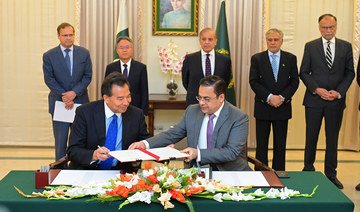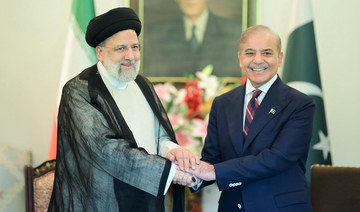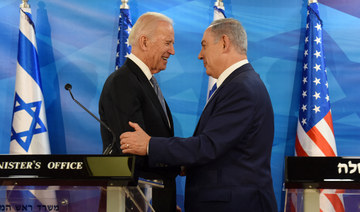DUBAI: Pfizer Inc’s experimental antiviral pill to treat COVID-19 was shown to cut by 89 percent the chances of hospitalization or death for adults at risk of developing severe disease, the company said on Friday.
It also comes as an offer to what could be a promising new weapon in the fight against the pandemic.
The trial’s results suggest that the oral drug surpasses Merck & Co. Inc’s pill, molnupiravir, which was shown last month to halve the risk of dying or being hospitalized for COVID-19 patients at high risk of serious illness.
Pfizer’s pill, with the brand name Paxlovid, could secure US regulatory approval by the end of the year. The Pfizer trial was stopped early due to its high success rate. Full trial data is not yet available from either company.
President Joe Biden said the US government has secured millions of doses of the Pfizer drug.
“If authorized by the FDA we may soon have pills that treat the virus in those who become infected,” Biden said. “The therapy would be another tool in our toolbox to protect people from the worst outcomes of COVID.”
Shares in Pfizer, which also makes one of the mostly widely used COVID-19 vaccines, were up 9 percent to $47.82, while Merck’s were down 9.3 percent to $82.09. Shares of vaccine makers took a hit, with Moderna Inc, Pfizer’s German partner BioNTech SE and Novavax all down 13-21 percent.
The pill is given in combination with an older antiviral called ritonavir. The treatment consists of three pills given twice daily. It has been in development for nearly two years.
Pfizer is in discussions with 90 countries over supply contracts for its pill, Chief Executive Officer Albert Bourla said in an interview.
Bourla said Pfizer expects to price its treatment close to where Merck has priced its pill. Merck’s US contract price for its pill is around $700 for a five-day course of therapy.
Even with the potential offered by the Pfizer and Merck pills, preventing COVID-19 infections through broad use of vaccines remains the best way to control a pandemic that has killed more than 5 million people worldwide, including more than 750,000 in the United States, according to infectious disease experts.
“Vaccines are going to be the most effective and reliable tool that we have in this pandemic,” said Dr. Grace Lee, professor of pediatrics at Stanford University School of Medicine. “These oral medications are going to augment our ability to really reduce the risk of severe disease, hospitalization and death, which is huge, but it won’t prevent infection.”
While more than 7 billion vaccine doses have been administered worldwide, that has covered only about half the world’s people. In the United States, 58 percent of all people, including 70 percent of adults, are fully vaccinated. There are more than 400,000 new COVID-19 cases daily worldwide, with infections rising in 50 countries.
Mizuho analyst Vamil Divan forecast a “very minor impact” from the Pfizer drug on vaccination among people who do not want the vaccine or a booster shot as recommended by US health regulators.
“I think there’s a small percentage of people that may decide not to get vaccinated, now that there are good treatment options,” Divan said.
Pfizer said it plans to submit interim trial results for its pill to the Food and Drug Administration (FDA) before the US Thanksgiving holiday on Nov. 25.
The company said it expects to manufacture 180,000 treatment courses by the end of this year and at least 50 million courses by the end of next year, including 21 million in the first half of 2022.
Antivirals need to be given as early as possible, before an infection takes hold, to be most effective.
The planned analysis of 1,219 patients in Pfizer’s study examined hospitalizations or deaths among people diagnosed with mild to moderate COVID-19 with at least one risk factor for developing severe disease, such as obesity or older age.
Among those given Pfizer’s drug within three days of symptom onset, the pill lowered the chances of hospitalization or death for adults at risk of developing severe COVID-19 by 89 percent compared to patients who received a placebo. Among these patients, 0.8 percent were hospitalized and none died by 28 days after treatment, compared to a 7 percent hospitalization rate and seven deaths in the placebo group.
Rates were similar for patients treated within five days of symptoms: 1 percent of the treatment group was hospitalized, compared to 6.7 percent for the placebo group, which included 10 deaths. Pfizer said that works out to being 85 percent effective at preventing hospitalization or death.
An FDA panel of outside experts is scheduled to meet Nov. 30 to discuss Merck’s pill, which was approved by British regulators https://www.reuters.com/business/health care-pharmaceuticals/britain-approves-mercks-oral-covid-19-pill-2021-11-04 in a world first on Thursday. Pfizer said it did not know if Paxlovid would be reviewed at that meeting.
Pfizer did not detail side any effects but said adverse events happened in about 20 percent of both treatment and placebo patients. Possible side effects include nausea and diarrhea.
Pfizer is holding discussions about a license for generic manufacturing of the pill for low-income countries, Unitaid’s Medicines Patent Pool said in a statement.
Pfizer says its antiviral pill slashes risk of severe COVID-19 by 89 percent
https://arab.news/psywp
Pfizer says its antiviral pill slashes risk of severe COVID-19 by 89 percent
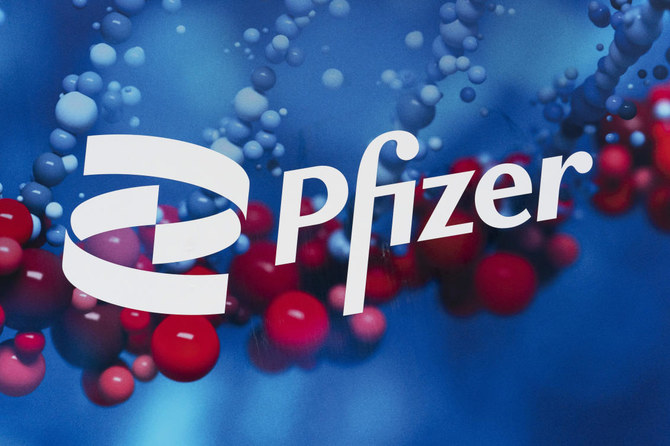
- Pfizer's pill, with the brand name Paxlovid, could secure U.S. regulatory approval by the end of the year
- President Joe Biden said the U.S. government has secured millions of doses of the Pfizer drug
Iran president arrives in Sri Lanka as minister sought for arrest
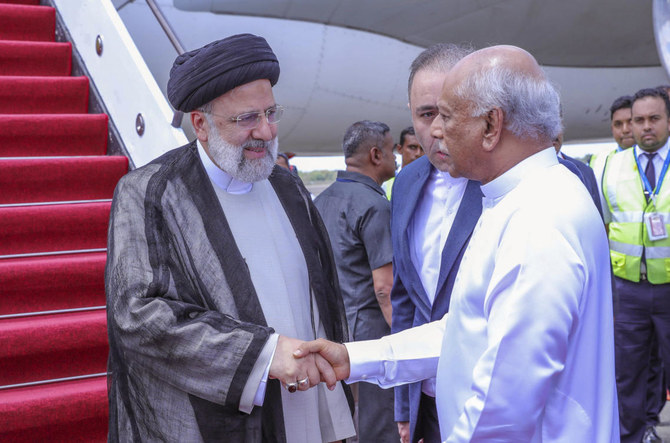
Raisi traveled to the island nation after concluding a state visit to Pakistan alongside Ahmad Vahidi, accused by Argentina of orchestrating the 1994 attack on a Jewish community center in Buenos Aires that killed 85 people.
Interpol issued a red notice requesting police agencies worldwide to take Vahidi into custody, and Argentina had asked both Pakistan and Sri Lanka to arrest him.
But the minister was not seen accompanying Raisi, who had arrived in Sri Lanka to inaugurate an Iran-backed power and irrigation project.
Iran’s official news agency IRNA reported that Vahidi was back in Iran on Tuesday, where he attended a ceremony to induct a new provincial governor.
An official from Sri Lanka’s foreign ministry told AFP that the interior minister was not listed as part of the Iranian delegation.
The 1994 assault has never been claimed or solved, but Argentina and Israel have long suspected the Iran-backed group Hezbollah carried it out at Iran’s request.
Prosecutors have charged top Iranian officials with ordering the attack, though Tehran has denied any involvement.
The court also implicated Hezbollah and called the attack against the AMIA — the deadliest in Argentina’s history — a “crime against humanity.”
Delayed project
Raisi arrived at an airport in southern Sri Lanka on Wednesday morning to inaugurate the Iran-backed $514 million Uma Oya irrigation and hydro-electricity project.
It was due to be commissioned in March 2014 but sanctions against the Islamic Republic saw the project mired in a decade of delays, Sri Lanka has said.
Sri Lanka funded most of the $514 million project after an initial investment of $50 million from the Export Development Bank of Iran in 2010, while construction was carried out by Iranian firm Farab.
Sri Lanka President Ranil Wickremesinghe’s office said Raisi’s visit symbolized “the cooperation between the two nations in this significant infrastructure endeavour.”
The two reservoirs are slated to irrigate 4,500 hectares (11,100 acres) of new land, while the hydro dam generators have a capacity of 120 megawatts.
Iran is a key buyer of Sri Lanka’s tea, the island’s main export commodity.
Sri Lanka is currently repaying a legacy debt of $215 million for Iranian oil by exporting tea. The country’s only oil refinery was built by Iran in 1969.
Raisi arrived in Sri Lanka after a three-day visit to Pakistan that followed tit-for-tat missile strikes in January in the region of Balochistan, which straddles the two nations’ porous border.
Tehran carried out the first strikes against an anti-Iran group inside Pakistan, with Islamabad retaliating by hitting “militant targets” inside Iran.
Both nations have previously accused each other of harboring militants on their respective sides of the border.
Ending Mideast conflict not a priority for most Americans: Survey
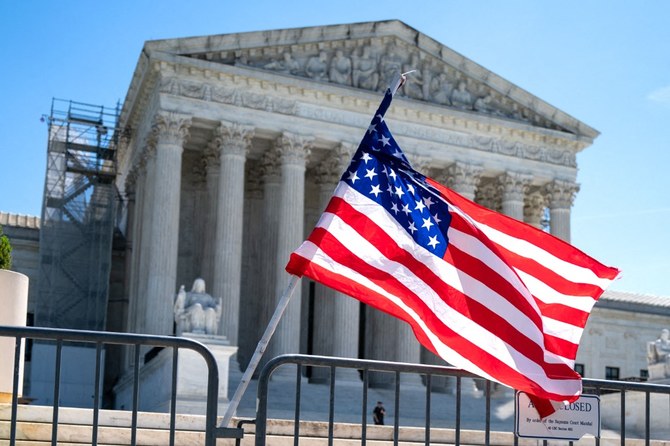
- 83% of respondents say Biden should focus on domestic policy
- 31% say supporting Israel should be given no priority
Chicago: A majority of Americans do not see the Israeli-Palestinian conflict as a foreign policy priority, according to two new concurrent surveys by the Pew Research Center.
Americans identified as their top four of 22 foreign policy priorities protecting the country from terrorism (71 percent), reducing illegal drugs (64 percent), preventing the spread of weapons of mass destruction (63 percent) and maintaining a military advantage over foreign powers.
Finding a solution to the Israeli-Palestinian conflict drew 29 percent, ranking only 14th among the 22 priorities.
The question of “supporting Israel” ranked even lower at 20th with 22 percent, with 31 percent opposing that support.
“Overall, a majority of Americans say that all 22 long-range foreign policy goals we asked about should be given at least some priority. Still, about three in 10 say supporting Israel, promoting democracy in other nations (28 percent) and supporting Ukraine (27 percent) should be given no priority,” Jacob Poushter, Pew associate director of research, told Arab News.
“Even with these priorities, 83 percent of Americans say it is more important for President Joe Biden to focus on domestic policy, compared with 14 percent who say he should focus on foreign policy.
“In 2019, 74 percent wanted then-President Donald Trump to focus on domestic policy, and 23 percent said he should focus on foreign policy.”
Pew researchers said finding a solution to the Israeli-Palestinian conflict was previously “a priority that saw no partisan difference at all” in a 2018 survey.
But the new surveys show a “partisan gap” emerging, with twice as many Democrats (36 percent) today than in 2018 calling the conflict “a priority,” while the share of Republicans (20 percent) has remained constant.
Twenty-nine percent of Americans say they have a great deal or fair amount of confidence in the UN’s ability to provide effective humanitarian aid to Gaza. Fifty-one percent do not have confidence and 19 percent are unsure.
Only 15 percent of Americans say they have confidence in the UN’s ability to enforce a ceasefire between Israel and Hamas. Sixty-seven percent have no confidence and 17 percent are unsure.
A recent Pew survey found that only 12 percent of Americans believe that lasting peace between Israelis and Palestinians is at least somewhat likely.
Blinken due in China seeking pressure but also stability
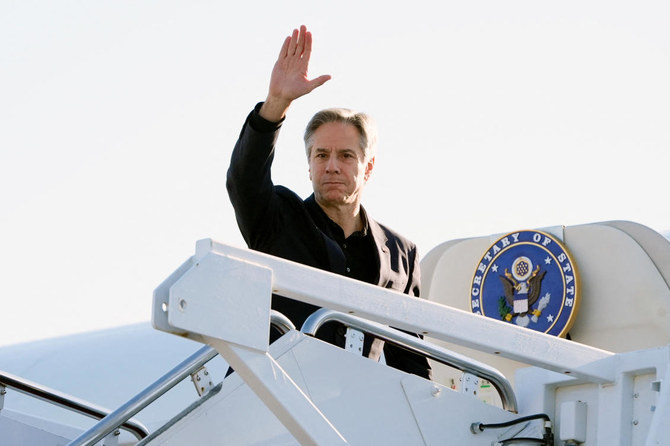
Shanghai: US Secretary of State Antony Blinken was due in China on Wednesday, as the United States ramps up pressure on its rival over its support for Russia while also seeking to manage tensions with Beijing.
The US diplomat will meet China's top brass on Friday in Beijing, where he is also expected to plead for restraint as Taiwan inaugurates a new leader, and to raise US concerns on Chinese trade practices -- a vital issue for President Joe Biden in an election year.
But Blinken is also seeking to stabilise ties, with tensions between the world's two largest economies palpably easing since his last visit in June.
At the time, he was the highest-ranking US official to visit China in five years, and the trip was followed by a meeting between the countries' presidents in November.
At that summit in California, Chinese President Xi Jinping agreed to a US wish list including restoring contact between militaries and cracking down on precursor chemicals to fentanyl, the powerful painkiller behind an addiction epidemic in the United States.
Blinken will start his visit on Wednesday in Shanghai.
While in the city, he will meet students and business leaders in what an aide called a bid to highlight warm ties between the American and Chinese peoples.
The friendly side trip -- the first visit by a US secretary of state to the bustling metropolis since Hillary Clinton in 2010 -- would have been unthinkable until recently, with hawks on both sides previously speaking of a new Cold War between the two powers.
Treasury Secretary Janet Yellen similarly toured the manufacturing hub of Guangzhou before visiting Beijing earlier this month.
A senior US official previewing Blinken's trip said that the United States and China were at a "different place than we were a year ago, when the bilateral relationship was at an historic low point".
"We also believe, and we have also clearly demonstrated, that responsibly managing competition does not mean we will pull back from measures to protect US national interests," he said.
The Biden administration's eagerness to engage China stands in stark contrast to its efforts to isolate Russia since its invasion of Ukraine in February 2022.
After initially being pleased that Beijing has not directly supplied weapons to Russia, the United States in recent weeks has accused China of lavishing industrial material and technology on Moscow.
Washington has encouraged European leaders, including German Chancellor Olaf Scholz, who recently visited Beijing, to stand firm on China not backing Russia, believing that it wants stable ties with the West as it focuses on addressing economic headwinds at home.
"If China purports on the one hand to want good relations with Europe and other countries, it can't on the other hand be fuelling what is the biggest threat to European security since the end of the Cold War," Blinken said Friday after Group of Seven talks in Capri, Italy.
The Biden administration has trumpeted the agreement with Xi on fentanyl as a success.
A State Department official said that since the November summit, China appears to have taken its first law enforcement measures on the matter since 2017.
Blinken will ask for further implementation, the official said.
"More regular PRC law enforcement action against PRC-based chemical companies and pill press manufacturers involved in illicit fentanyl supply chains would send a strong signal of China's commitment to address this issue," the official said, referring to the People's Republic of China.
One source of friction between the two countries is new legislation that cleared the US Congress on Tuesday -- and which Biden intends to sign -- requiring the wildly popular social media app TikTok to be divested from its Chinese parent company ByteDance, or be shut out of the American market.
Biden faces a rematch in November against former president Donald Trump, who has vowed a more confrontational approach against China.
Yun Sun, a senior fellow at the Washington-based Stimson Center, said that China's leaders, eager to focus on their economy, were in a wait-and-see mode ahead of the US election.
"The Chinese understand that the Biden administration is unlikely to deliver any good news on trade because that simply does not support the election agenda," she said.
For Chinese leaders this year, "their priority is to keep the relationship stable".
"Until there is clarity on who the next administration will be, I don't think they see a better strategy," she said.
Arrests follow barricades and encampments as US college students nationwide protest Gaza war
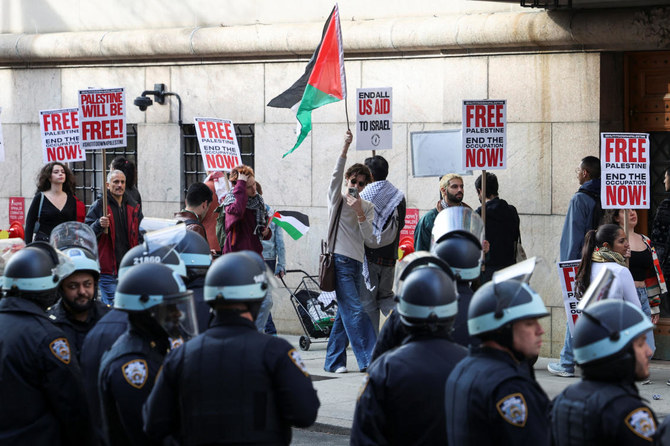
- More than 100 pro-Palestinian demonstrators who had camped out on Columbia University’s upper Manhattan campus were arrested last week
Standoffs between pro-Palestinian student protesters and universities grew increasingly tense on both coasts Wednesday as hundreds encamped at Columbia University faced a deadline from the administration to clear out while dozens remained barricaded inside two buildings on a Northern California college campus.
Both are part of intensifying demonstrations over Israel’s war with Hamas by university students across the country, leading to dozens of arrests on charges of trespassing or disorderly conduct.
Columbia’s President Minouche Shafik in a statement Wednesday set a midnight deadline to reach an agreement with students to clear the encampment, or “we will consider alternative options.”
That deadline passed without news of an agreement. Videos show some protesters taking down their tents while others doubled down in speeches. The heightened tension arrived the night before US House Speaker Mike Johnson’s trip to Columbia to visit with Jewish students and address antisemitism on college campuses.
Across the country, protesters at California State Polytechnic University, Humboldt, started using furniture, tents, chains and zip ties to block the building’s entrances Monday evening. The defiance was less expected in the conservative region of California, some 300 miles (480 kilometers) north of San Francisco.
“We are not afraid of you!” the protesters chanted before officers in riot gear pushed into them at the building’s entrance, video shows. Student Peyton McKinzie said she was walking on campus Monday when she saw police grabbing one woman by the hair, and another student having their head bandaged for an injury.
“I think a lot of students are in shock about it,” she told The Associated Press.
Three students have been arrested, according to a statement from Cal Poly Humboldt, which shutdown the campus until Wednesday. An unknown number of students had occupied a second campus building Tuesday.
The upwelling of demonstrations has left universities struggling to balance campus safety with free speech rights. Many long tolerated the protests, which largely demanded that schools condemn Israel’s assault on Gaza and divest from companies that sell weapons to Israel.
Now, universities are doling out more heavy-handed discipline, citing safety concerns as some Jewish students say criticism of Israel has veered into antisemitism.
Protests had been bubbling for months but kicked into a higher gear after more than 100 pro-Palestinian demonstrators who had camped out on Columbia’s upper Manhattan campus were arrested Thursday.
By late Monday at New York University, police said 133 protesters were taken into custody and all had been released with summonses to appear in court on disorderly conduct charges.
In Connecticut, police arrested 60 protesters — including 47 students — at Yale, after they refused to leave an encampment on a plaza at the center of campus.
Yale President Peter Salovey said protesters had declined an offer to end the demonstration and meet with trustees. After several warnings, school officials determined “the situation was no longer safe,” so police cleared the encampment and made arrests.
In the Midwest on Tuesday, a demonstration at the center of the University of Michigan campus had grown to nearly 40 tents, and nine anti-war protesters at the University of Minnesota were arrested after police took down an encampment in front of the library. Hundreds rallied to the Minnesota campus in the afternoon to demand their release.
Harvard University in Massachusetts has tried to stay a step ahead of protests by locking most gates into its famed Harvard Yard and limiting access to those with school identification. The school has also posted signs that warn against setting up tents or tables on campus without permission.
Literature Ph.D. student Christian Deleon said he understood why the Harvard administration may be trying to avoid protests but said there still has to be a place for students to express what they think.
“We should all be able to use these kinds of spaces to protest, to make our voices heard,” he said.
Ben Wizner, a lawyer with the American Civil Liberties Union, said college leaders face extremely tough decisions because they have a responsibility to ensure people can express their views, even when others find them offensive, while protecting students from threats and intimidation.
The New York Civil Liberties Union cautioned universities against being too quick to call in law enforcement in a statement Tuesday.
“Officials should not conflate criticism of Israel with antisemitism or use hate incidents as a pretext to silence political views they oppose,” said Donna Lieberman, the group’s executive director.
Leo Auerbach, a student at the University of Michigan, said the differing stances on the war hadn’t led to his feeling unsafe on campus but he has been fearful of the “hateful rhetoric and antisemitic sentiment being echoed.”
“If we’re trying to create an inclusive community on campus, there needs to be constructive dialogue between groups,” Auerbach said. “And right now, there’s no dialogue that is occurring.”
At the Massachusetts Institute of Technology, physics senior Hannah Didehbani said protesters were inspired by those at Columbia.
“Right now there are several professors on campus who are getting direct research funding from Israel’s ministry of defense,” she said. “We’ve been calling for MIT to cut those research ties.”
Protesters at the University of California, Berkeley, which had an encampment of about 30 tents Tuesday, were also inspired by Columbia’s demonstrators, “who we consider to be the heart of the student movement,” said law student Malak Afaneh.
Campus protests began after Hamas’ deadly attack on southern Israel, when militants killed about 1,200 people, most of them civilians, and took roughly 250 hostages. During the ensuing war, Israel has killed more than 34,000 Palestinians in the Gaza Strip, according to the local health ministry, which doesn’t distinguish between combatants and noncombatants but says at least two-thirds of the dead are children and women.
Argentina seeks arrest of Iran minister, recently in Pakistan, over 1994 Jewish center bombing
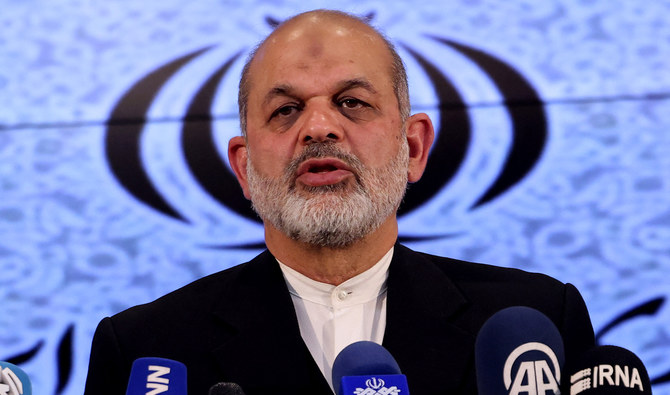
- Argentina contacted Interpol and asked Pakistani, Sri Lankan governments to arrest Iran’s interior minister
- The 1994 bombing has never been claimed or solved, but Argentina has suspected Iran to be behind the attack
BUENOS AIRES: Argentina has asked Interpol to arrest Iran’s interior minister over the 1994 bombing of a Jewish community center in Buenos Aires that killed 85 people, the foreign ministry said Tuesday.
That minister, Ahmad Vahidi, is part of an Iranian delegation visiting Pakistan and Sri Lanka, and Interpol has issued a red alert seeking his arrest at the request of Argentina, the ministry said in a statement.
Argentina has also asked those two governments to arrest Vahidi, it added.
On April 12 a court in Argentina placed blame on Iran for the 1994 attack against the AMIA Jewish community center in Buenos Aires and for a bombing two years earlier against the Israeli embassy, which killed 29 people.
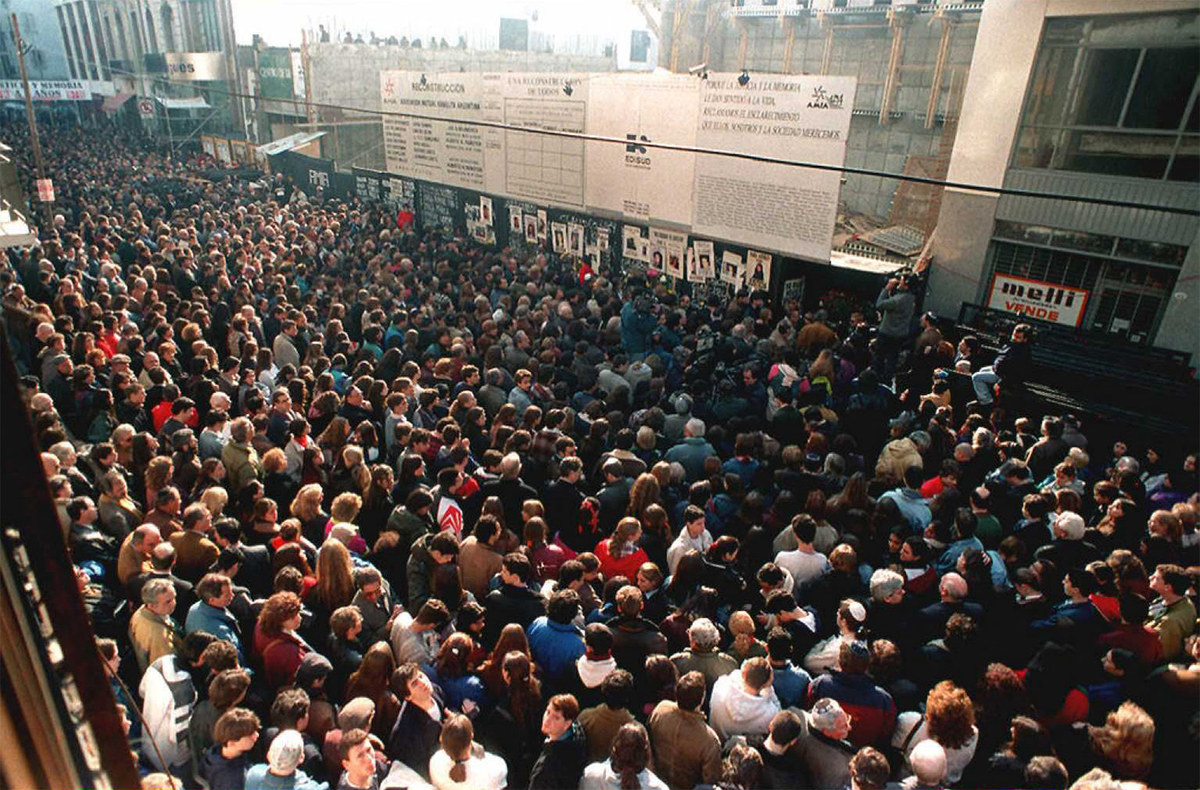
The 1994 assault has never been claimed or solved, but Argentina and Israel have long suspected the Iran-backed group Hezbollah carried it out at Iran’s request.
Prosecutors have charged top Iranian officials with ordering the attack, though Tehran has denied any involvement.
The court also implicated Hezbollah and called the attack against the AMIA — the deadliest in Argentina’s history — a “crime against humanity.”
Tuesday’s statement from the foreign ministry said: “Argentina seeks the international arrest of those responsible for the AMIA attack of 1994, which killed 85 people, and who remain in their positions with total impunity.”
“One of them is Ahmad Vahidi, sought by Argentine justice as one of those responsible for the attack against AMIA,” said the statement, which was co-signed by the security ministry.
Argentina has the largest Jewish community in Latin America, with some 300,000 members. It is also home to immigrant communities from the Middle East — from Syria and Lebanon in particular.



